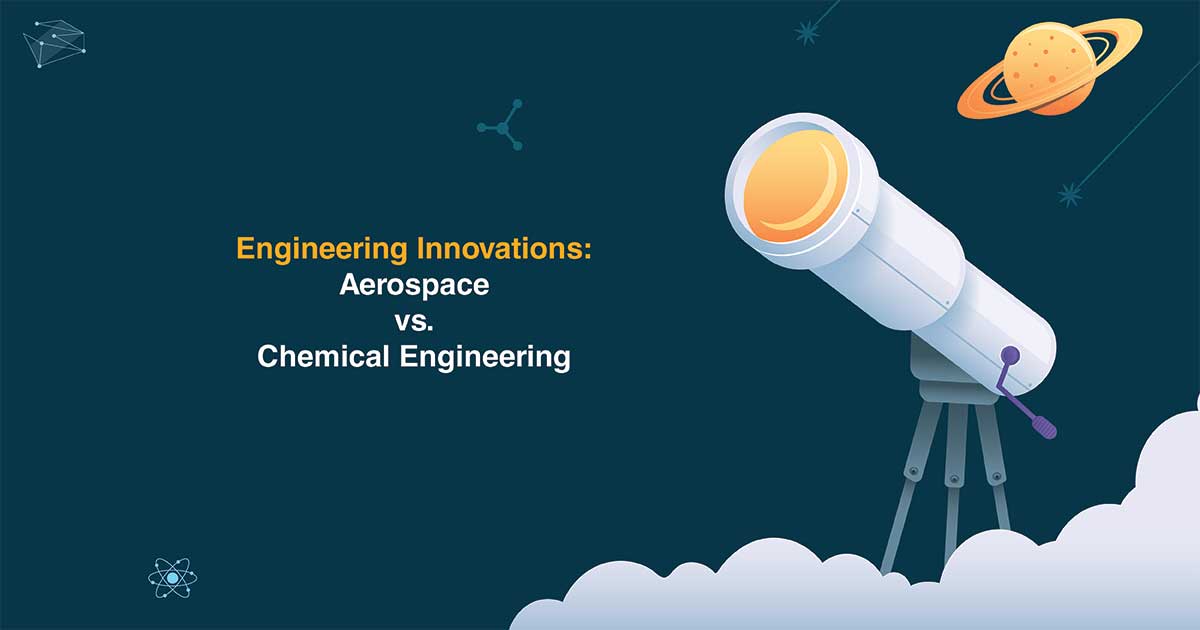FET Blogs


FET Blogs



25 March 2024
Aerospace Engineering and chemical engineering are two streams in the broad spectrum of engineering embarking on the success of scientific innovation. Engineering is regarded as the strongest pillar of technology and scientific advancements. Aerospace Engineering and chemical engineering stand out for their research progress and scientific contributions to the world. Both fields of study are filled with scopes to conquering miraculous accomplishments. Here is everything you need to know about these two streams of professional courses in detail before choosing one.
Aerospace and chemical engineering courses are available at both bachelor’s (B-Tech) and master’s (M-Tech) levels. The course duration for these courses is listed below:
The eligibility criteria for enrolling in engineering bachelor’s programmes for both streams are completion of 12th of equivalent studies with maths and science as primary subjects.
The eligibility criteria for enrolling in for engineering master’s programme for both streams is completing a bachelor’s in the respective programme with an aggregate accepted by the university.
The branch of aerospace engineering and chemical engineering has been popular for a very long time. These streams are popular and celebrated for various reasons ranging from their significant impact on the global economy to the subject challenged. Here is a structural outline of both courses for further clarity.
The aerospace and chemical industry has always been a great contributor to the world’s growing economy. Since the time of the academic evolution of engineering, the course has grown to a career-promising field and below are a few of the several options available in the job market.
Aerospace Engineering and Chemical Engineering are vast with the potential to bring a beneficial change to mankind. After, having a closer look at the core areas of study and career prospects of both the streams of the discussed professional course, it is inferred that both disciplines portray the transformative power of the subject relevance. and human innovations. Both fields are career-promising for the subject potential and the hefty contribution of the respective sectors towards the global economy. Hence, the right choice of stream with passion and enthusiasm can further elevate the ever-evolving landscape of science.
A1: It is possible for chemical engineers to work in the aerospace sector. Their knowledge is useful in fields like thermal control systems, materials engineering, and fuel and propellant development.
Chemical engineers are frequently employed by large aerospace companies for positions where material science, thermodynamics, and chemistry meet with aerospace applications.
A2: Mechanical engineering is considered the closest engineering discipline to aerospace engineering. Both disciplines share significant overlap in areas such as fluid mechanics, structural analysis, thermodynamics, etc.
A3: Yes. NASA actively recruits individuals with degrees in aerospace engineering for roles in aircraft, spacecraft design, flight systems, and space mission support. Aerospace engineering is one of the core disciplines sought for technical positions at NASA.
A4: Aerospace engineering is the best choice for an aircraft-related career. It focuses specifically on the design and development, testing, and maintenance of aerospace vehicles.
A5: Indeed, aerospace engineers are employed by ISRO (Indian Space Research Organisation) for a variety of positions in avionics, propulsion systems, spacecraft design, launch vehicle development, and mission planning.
For technical roles, a bachelor's degree in aerospace engineering is frequently accepted, particularly through tests like ISRO's Centralised Recruitment Board (ICRB) or GATE-based hiring.
Popular Post
17 February 2026
AIE Full Form
10 February 2026
AEIE Full Form
22 January 2026
AE Full Form
16 January 2026
What is Aerospace Engineering?
16 January 2026
What is Chemical Engineering?
Ask an Expert for Free